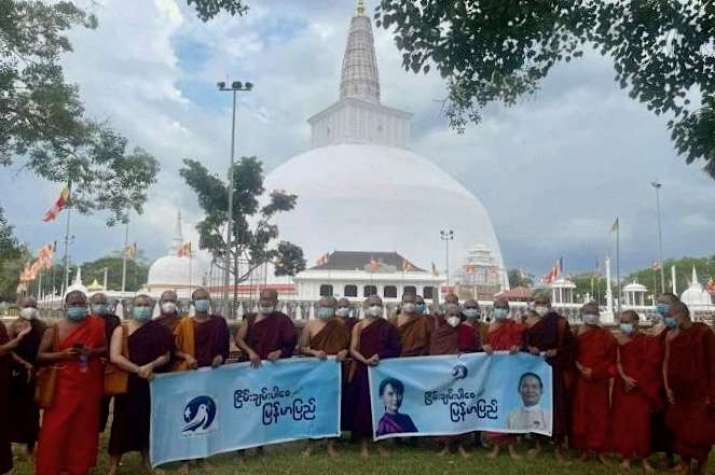
Members of the Myanmar Peace Sangha Union in Sri Lanka on Saturday paid homage at the great stupa Ruwanwelisaya, one of most sacred Buddhist sites in Sri Lanka and said to enshrine many relics of the historical Buddha. The assembled monks recited the Metta Sutta and the Mora Sutta, sharing the merit from their ceremony with pro-democracy protestors who have lost their lives protesting the military coup in Myanmar.
The monks also prayed for the immediate release of members of Myanmar’s civilian government who have been detained since the military seized power in February, including President Win Myint and State Counsellor Aung San Suu Kyi.
The death toll among protestors in Myanmar who have resisted the military-led takeover rose over the weekend, with numerous reports indicating that at least 114 people were killed on Saturday alone, including seven children.
About 20,000 people, including monks, took part in an anti-military dictatorship rally in Tangse, Sagaing, today (Mar 29) .#WhatsHappeningInMyanmar pic.twitter.com/dpAJkbMqUZ
— Myanmar Now (@Myanmar_Now_Eng) March 29, 2021
“As of 28 March, 459 people are now confirmed killed by this junta coup,” the independent advocacy group Assistance Association for Political Prisoners (AAPP) reported in a daily update. “Children, students, youths, and civilians have all been killed since the coup. This is the number documented and verified by AAPP, the actual number of fatalities is likely much higher as the death toll continues to rise.” (Assistance Association for Political Prisoners)
On Sunday, two senior UN officials denounced the “systematic” attacks on pro-democracy protestors in Myanmar and stressed that the international community bore a responsibility to prevent such atrocities.
“The shameful, cowardly, brutal actions of the military and police—who have been filmed shooting at protesters as they flee, and who have not even spared young children—must be halted immediately,” Alice Wairimu Nderitu, United Nations Special Adviser on the Prevention of Genocide, and Michelle Bachelet, the High Commissioner for Human Rights, said in a joint public statement. “The international community has a responsibility to protect the people of Myanmar from atrocity crimes.” (OHCHR)
A silent strike today (Mar 29) in Kyaukme, northern Shan State, to mourn and protest the shooting death of innocent children by the coup regime. #WhatHappeningInMyanmar pic.twitter.com/0N4f8ixKSJ
— Myanmar Now (@Myanmar_Now_Eng) March 29, 2021
“We must ensure accountability for past crimes and deter the most serious international crimes from being committed,” the statement continued. “The failure to address the atrocity crimes the [military] has committed in the past, including against Rohingya and other minorities, has brought Myanmar to this terrible pass. There is no way forward without accountability and fundamental reform of the military.” (OHCHR)
Myanmar’s military declared a year-long state of emergency on 1 February, after detaining President Win Myint, State Counselor Aung San Suu Kyi, and other senior members of the governing National League for Democracy (NLD) party. The coup d’état took place just hours before the country’s new parliament was due to convene following a general election in November last year, during which the NLD made substantial electoral gains.
Suu Kyi, who served the country from 2016–21 following a long struggle for democracy that overturned decades of military rule, remains under house arrest and is facing a growing litany of charges from the coup leaders in an apparent attempt to provide a legal veneer for her detention. Before leading the civilian government, Suu Kyi, now 75, spent almost 15 years under house arrest for her efforts to bring democracy to Myanmar.
The junta's armed forces are seen destroying CCTV cameras in Yangon's Sanchaung Township on March 26. With mobile internet & many wifi services blocked, & reporters kicked off the streets or jailed, the regime has eyes on eliminating CCTV & mobile phone cameras of the citizens. pic.twitter.com/2yWpCMukVy
— Myanmar Now (@Myanmar_Now_Eng) March 29, 2021
The military, which had backed the parliamentary opposition in the national election, has asserted that it staged the coup in response to electoral fraud, however the national election commission has said there is no evidence to support these claims. The NLD won around 80 per cent of the available parliamentary seats in last year’s vote.
Since seizing power, the self-styled State Administration Council (SAC), led by military commander-in-chief General Min Aung Hlaing, has unilaterally amended the country’s treason and sedition legislation in an apparent bid to secure impunity for the coup leaders.
A nationwide civil disobedience movement (CDM) has quickly gathered pace in the wake of the coup, with hundreds of thousands of people protesting in towns and cities across the country, denouncing the military and calling for the release of detained civilian leaders. The CDM movement, which began with medical personnel, has been taken up by teachers, engineers, railway workers, bank staff, and even some members of the police force, who have switched sides to join the protestors.
“As of 28 March, a total of 2559 people are detained in relation to the attempted military coup on February 1, of them 37 are sentenced,” the AAPP reported in its daily update. “A further 119 people have been issued arrest warrants. We have not completed verification of all recently released detainees over the last four days, but are continuing to update the list of names who were released.” (Assistance Association for Political Prisoners)
The body of 20-year-old nurse Thinzar Hein was brought back to her hometown of Kani, Sagaing, today. As a member of a rescue team, she was attending to victims shot by the junta's troops in Monywa on Sunday when she too was shot in the head and killed. #WhatsHappeninglnMyanmar pic.twitter.com/1UH3LL7zLz
— Myanmar Now (@Myanmar_Now_Eng) March 29, 2021
See more
Sri Lankan monks pray for victims in Myanmar (Mizzima)
Daily Briefing in Relation to the Military Coup (Assistance Association for Political Prisoners)
Myanmar: Top UN officials condemn “systematic” attacks on peaceful protesters, and flag international responsibility to protect the people from atrocity crimes (OHCHR)
Myanmar becomes a nation without newspapers (Myanmar Now)












